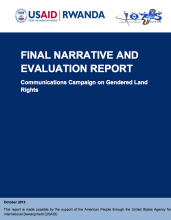Land Library
Welcome to the Land Portal Library. Explore our vast collection of open-access resources (over 74,000) including reports, journal articles, research papers, peer-reviewed publications, legal documents, videos and much more.
/ library resources
Showing items 1 through 9 of 22.This report presents the results of a small scale household survey that was conducted in May
2015 to assess the extent to which rural Rwandan citizens are vulnerable or resilient to
environmental, market and land tenure risks and the level they understand the laws and rights
Between October 2014 and October 2015, Radio Ishingiro with the support of USAID
Land Project implemented a Communications Campaign focused on influencing the
attitudes and mindsets of men and boys about gender-equal land rights to overcome
This research, entitled "The Impact of Gendered Legal Rights to Land on the Prevalence and Nature of Intra- and Inter-Household Disputes" set out to interrogate the changing landscape of gendered land rights in Rwanda, and to examine the impact of the statutory changes introduced by laws governin
Before 1999, land rights in Rwanda were governed by three regimes: customary
(traditional) law, colonial laws still in effect, and laws enacted after independence. In each of
these, men were privileged in ownership and control of land whereas women were excluded
Across equatorial and east Africa, climate change is affecting the frequency, intensity
and variability of regional climate patterns.1 Changes in rainfall patterns, temperatures
and storm intensity are having significant effects on national economies, regional
In Africa, land has an emotional and mystical value beyond the economic consideration and
represents the social security and the continuity and independence of a family. In much of rural
Africa, land constitutes the primary source from which millions of people derive their daily
The Land Use Consolidation Act (LUC) was introduced in 2008 and is an important
component of agricultural policy in Rwanda. As part of the Government of Rwanda’s
broader Crop Intensification Program (CIP), LUC entails participating farmers
To say that access to land is one of the most important conditions for the
empowerment of African women, would be an understatement. The cultivation of land is one
of the main sources of income and economic wealth depends strongly on a well-elaborated
As Parliamentary gender quotas have become increasingly popular, so too
has the debate surrounding their effectiveness in enhancing women’s
representation and gender equality in governments around the world. Women offer









